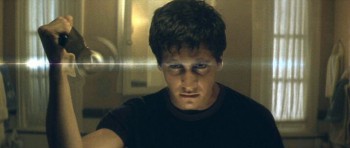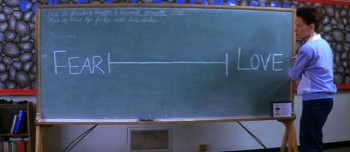|
If you've grown utterly sick of films that you can actually make sense of the first time 'round, here's a big spiny horse pill for you to chug down. If you can successfully figure out precisely what's going on after four times through, write me with your insight-and no sneaky listening to the DVD commentary track. Oh hell, never mind; listen to it anyway-you'll still be confused.  It would be easy on first sight to unfairly lump this film into the "supernatural weirdness teen-flick" genre; after all, it does feature both teens and supernatural-or at least unnatural-weirdness. It does not feature anyone running up an unlit alley from a monster and suddenly finding that they have totally forgotten how to climb a chain-link fence, or a last-minute "Booga! It's not really over after all! Ahh, just kidding, it's over...or IS it?" sort of 'surprise' ending that surprises no one over the age of two. Ostensibly a science-fiction piece, Donnie Darko throws a whole cornucopia of ideas at the audience, most of which have nothing to do with SF as it's normally perceived. The characters and the script are all concerned with perfectly ordinary issues: dealing with family troubles, occupations that don't reward individuality, self-appointed heroes that fail to save anything or anyone...and of course, the distress that can be caused by visions of a demonic-looking rabbit that forebodes of bad times ahead, to the tune of the world ending. Is Donnie emotionally disturbed, or genuinely seeing a big evil bunny? (Or is he emotionally disturbed because he's genuinely seeing a big evil bunny? That would do it for me, I can tell you.) My guess is the parenthetical one, but make up your own mind. If your sci-fi tastes run to films about folks with crinkly appliances on their foreheads or hot chicks in leather, we ain't on board the same boat here, and you'd best steer clear lest you accidentally run into the dock and impale somebody with your prow, like what happens to the shark in Jaws: The Revenge. The film is primarily concerned with the oft-unrewarding struggle to find one's path through life (we even see a literal manifestation of such a path,) from the desperately lonely boy with a loving family and a pretty cool girlfriend who still feels disconnected from the world, to the teacher who rails against the "prescribed nonsense" the school system forces upon unresponsive students, to the career-minded self-help guru with bigger problems than anyone he's supposedly helping; the film takes the very clear position that those to whom we wish to turn for solutions can be just as fucked-up as we are. We can't help but love Donnie when he confronts the motivational speaker over the uselessness of his "solutions": the speaker can only defensively deflect Donnie's criticisms as products of fear and uncertainty, while Donnie has the honesty and strength to admit his problems and still call bullshit on the speaker's buzzword-simplistic attempts at answers. 
I really enjoyed this film when I first saw it, but over time I've gradually fallen out of love with it as its flaws became more apparent. Even with the director's commentary on, it remains true that the final payoff doesn't make a great deal of sense and doesn't explain anything. Listening to the aforementioned commentary is very telling, in that it describes things which are supposed to be happening that we could never have possibly figured out from just watching what's on screen. The deleted scenes also give a little more insight into what writer-director Richard Kelly was intending the film to say, which seems to be, irritatingly enough, that Donnie is depressed and destructive because he doesn't believe in God, one of those unsubstantiated stereotypes that I really wish would go away. The film spends much time on decrying New Agey quick-fix approaches to dealing with life, while seeming to simultaneously offer up the notion that believing in some unseen and unknowable puppet master is any better as a solution to existential angst. Ultimately, the film stops (barely) short of naming God as the Great Mystery, seeming to prefer a more ambiguous identity to the man or men behind the curtain. The story is about the searching, but not the finding, which is fortunate, since films that write themselves into that corner inevitably have to cop out when the time comes to give the message of hope that the author doesn't really know (AhhhemmmContactmmmggh.) Still, the science-fictiony parts of Donnie Darko are its least successful parts, and it's easy to find yourself wishing all the babble about wormholes and such would disappear in favor of more character scenes, since those areas are where the film works best. The atmosphere that pervades the film is so unusual and captivating that when we hear such a straightforward phrase as "time travel" suddenly pop out at us, the magic seems to evaporate for the duration. For a film that's often both portentously spooky and heartbreakingly sad, it's never despairing or nihilistic. Right through to the end, it maintains a sense of hope, and of wonder, and the straightforward adolescent idealism of "taking away all those hours of darkness and replacing them with something better." What can we do? Try. That advice I'd offer right back to Richard Kelly. It's clear that he has a good deal of talent, and I hope his next film, whenever it comes out and whatever it turns out to be, will contain more of his strengths and fewer ventures into rickety plot machinations that don't hang together. This one came so close. -review by Matt Murray
|
|
||||||||